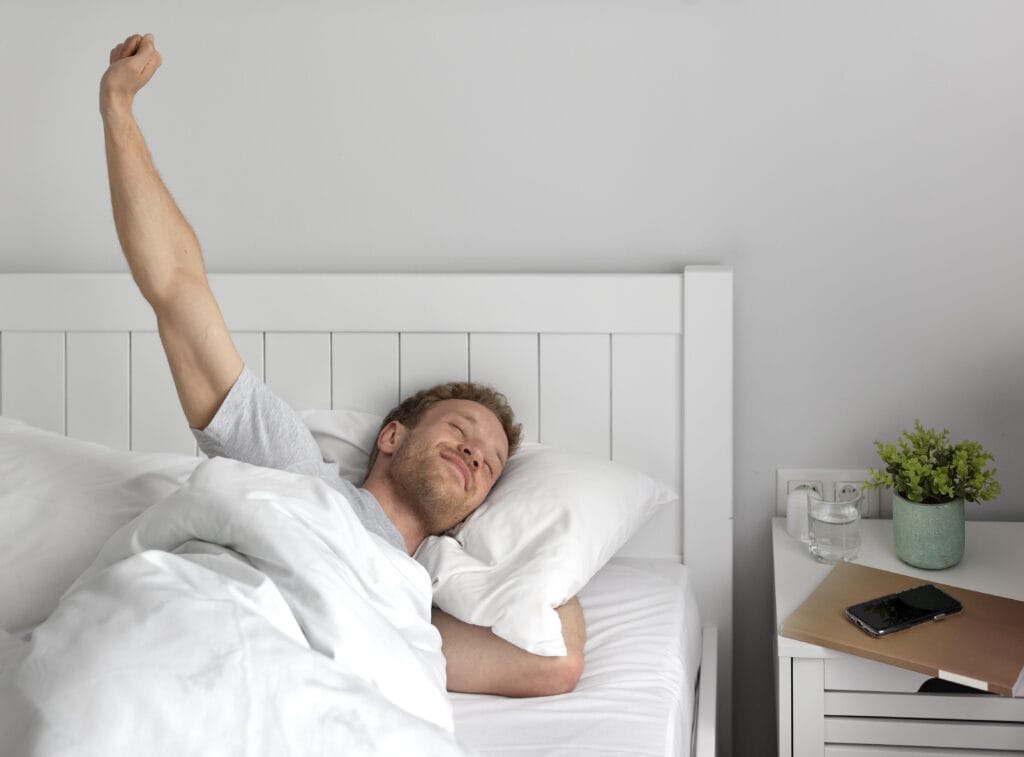Many individuals connect fitness with diets, exercise regimens, and supplementation with vitamins. However, there may be a stronger link between sleep and your body’s ability to heal than you may realize. If you want your body to function efficiently and heal appropriately, getting enough sleep at night is not just a nice-to-have; it’s a must. Getting enough sleep can improve your overall fitness outcomes and aid in the self-healing of your muscles. Therefore, remember to get enough good sleep while you’re trying to become in shape. It plays a significant role in achieving your ideal physical condition.
The Science Behind Sleep and Recovery
The following explains why sleep is crucial for your fitness:
1. Muscle Repair and Growth
A substance known as growth hormone is released by your pituitary gland when you are deeply asleep. This vital hormone is crucial for the growth and self-healing of your muscles. Performing strenuous exercises might cause injury to your muscles. Growth hormone promotes the development of lean muscle and aids in the repair of these muscles. In other words, it helps you build stronger, more defined muscles without gaining extra weight. Therefore, getting adequate deep sleep is crucial for the development of your muscles and level of fitness.
2. Protein Synthesis
Your body produces new proteins more efficiently when you’re asleep. Protein synthesis is the process by which these proteins aid in muscle growth and repair, which makes them crucial. You risk disrupting this crucial process if you don’t get enough or quality sleep. You may gradually lose muscle as a result of this. Thus, keeping your muscles requires obtaining enough sleep.
3. Hormonal Balance
As it supports the regulation of vital hormones like cortisol and testosterone, getting adequate sleep is crucial. The stress hormone is another name for cortisol. Lack of sleep can increase cortisol levels, which can cause you to lose muscle and gain extra fat. Testosterone is essential for muscular growth and strength maintenance. Therefore, getting a good night’s sleep helps maintain the balance of these hormones, which can aid in body fat management and muscle growth.
4. Mental Recovery
In order to be physically fit, you must not only build your bones and muscles but also give your brain the rest it requires. Getting enough sleep is essential for improving brain function. It helps you focus better, remember things better, and make wise decisions. Whether you’re lifting weights or running a marathon, these mental skills are critical.

Sleep Deprivation and Its Impact on Fitness
Sleep deprivation can seriously undermine your fitness objectives in a number of ways:
1. Reduced Strength and Endurance: Your body performs less effectively when you’re fatigued. Even one sleep-deprived night might weaken you and reduce your endurance during exercise.
2. Increased Risk of Injuries: Fatigue impairs coordination and reaction time, increasing the risk of injury during exercise.
3. Slower Recovery: Your muscles and tissues won’t recover from exercise as rapidly if you don’t get enough sleep.
4. Weight Gain: Sleep deprivation alters the hormones ghrelin and leptin, which regulate hunger, causing you to feel hungrier, eat more, and maybe put on weight.
How Much Sleep Do You Really Need?
The average adult should try for 7 to 9 hours of sleep per night. To enable their bodies recuperate completely and function at their peak, athletes and those who engage in strenuous exercise may require an additional 8 to 10 hours of sleep.
The quality of your sleep is equally as important as how many hours you get. If your sleep is interrupted or you find yourself tossing and turning a lot, it can be just as damaging as sleeping too little. Thus, getting enough good sleep is essential to waking up feeling rejuvenated and prepared for the day.
Tips for Better Sleep and Faster Fitness Recovery
- Keep a Regular Sleep Schedule:
Make an effort to go to bed and wake up at the same time every day, including on the weekends. This behaviour helps keep your body’s internal clock in sync. - Develop a Calming Bedtime Routine:
Take part in soothing activities like reading, stretching, or meditation before going to bed. Steer clear of stressful talks and screen time right before bed. - Optimize Your Sleep Environment:
Make sure your bedroom is quiet, dark, and cool to promote restful sleep. Think about employing a sleep mask for comfort, a white noise machine to drown out outside noises, or blackout drapes to block out light. - Reduce Alcohol and Caffeine: Use Alcohol and coffee can both interfere with your sleep. Steer clear of alcohol right before bed and try to avoid caffeine in the afternoon.
- Schedule Your Workout: Proper exercise promotes better sleep, but it may make it more difficult to fall asleep if done too soon before bed. Your workout should ideally be finished two to three hours before bed.

Athletes Who Prioritize Sleep
Athletes LeBron James and Roger Federer are well-known for their diligence and hard work. They emphasize the value of sleep and recuperation for their bodies in addition to training. Roger Federer, for example, ensures that he gets 10 to 12 hours of sleep per night. He is aware that staying ahead of the competition is facilitated by getting adequate sleep.
For these elite athletes, getting enough sleep is essential to their training regimen. Their strategy may teach us a lot: making sleep a priority is crucial for enhancing performance and preserving health.
Final Thoughts:
If you’re serious about reaching your fitness objectives, keep in mind how crucial sleep is. Getting enough sleep is crucial for improving your performance, accelerating your body’s healing process, and reducing your risk of injury. Good sleep should be a fundamental component of your routine, regardless of whether you’re an athlete, frequent gym-goer, or someone who is just beginning to live a healthier lifestyle. To support your workout efforts and improve your general well-being, make sure you’re getting enough good sleep.
Ready to Improve Your Sleep Routine?
Have you ever seen how having adequate sleep can alter your training and improve your post-workout recovery? Please share your ideas by leaving a comment below; we would greatly appreciate hearing from you! Additionally, remember to publish this on social media to share it with your fitness-loving friends. Additionally, it may help them sleep better and feel more rested after working out!

